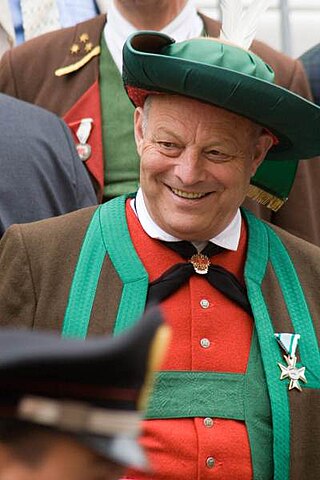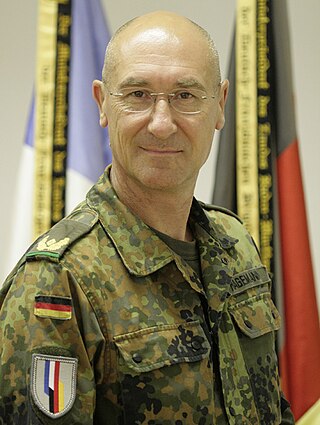Related Research Articles

The Frontier March of Posen–West Prussia was a province of Prussia from 1920/1922 to 1938, covering most of lands of historical Greater Poland that were not included in the Second Polish Republic. Posen–West Prussia was established in 1922 as a province of the Free State of Prussia within Weimar Germany, formed from merging three remaining non-contiguous territories of Posen and West Prussia, which had lost the majority of their territory to the Second Polish Republic following the Greater Poland Uprising. From 1934, Posen–West Prussia was de facto ruled by Brandenburg until it was dissolved by Nazi Germany, effective 1 October 1938 and its territory divided between the provinces of Pomerania, Brandenburg and Silesia. Schneidemühl was the provincial capital. Today, lands of the province are entirely contained within Poland.

A Generaloberst was the second-highest general officer rank in the German Reichswehr and Wehrmacht, the Austro-Hungarian Common Army, the East German National People's Army and in their respective police services. The rank was equal to a four-star full general but below a general field marshal. The rank was equivalent to a Generaladmiral in the Kriegsmarine until 1945 or to a Flottenadmiral in the Volksmarine until 1990. It was the highest ordinary military rank and the highest military rank awarded in peacetime; the higher rank of general field marshal was awarded only in wartime by the head of state. In general, a Generaloberst had the same privileges as a general field marshal.

Eduard Heinrich Flottwell was a Prussian Staatsminister. He served as Oberpräsident (governor) of the Grand Duchy of Posen and of the Saxony, Westphalia and Brandenburg Provinces. He was also Prussian Minister of Finance (1844-1846) and Minister of Interior (1858-1859).

The Order of the Black Eagle was the highest order of chivalry in the Kingdom of Prussia. The order was founded on 17 January 1701 by Elector Friedrich III of Brandenburg. In his Dutch exile after World War I, deposed Emperor Wilhelm II continued to award the order to his family. He made his second wife, Princess Hermine Reuss of Greiz, a Lady in the Order of the Black Eagle.

The Order of the Red Eagle was an order of chivalry of the Kingdom of Prussia. It was awarded to both military personnel and civilians, to recognize valor in combat, excellence in military leadership, long and faithful service to the kingdom, or other achievements. As with most German other European orders, the Order of the Red Eagle could be awarded only to commissioned officers or civilians of approximately equivalent status. However, there was a medal of the order, which could be awarded to non-commissioned officers and enlisted men, lower ranking civil servants and other civilians.
The Düsseldorf School of painting is a term referring to a group of painters who taught or studied at the Düsseldorf Academy roughly between 1819 and 1918, first directed by the painter Wilhelm von Schadow.

The Landeshauptmann or Landeshauptfrau is the chairman of a state government and the supreme official of an Austrian state and the Italian autonomous provinces of South Tyrol and Trentino. His or her function is equivalent to that of a minister-president or premier. Until 1933 the term was also used in Prussia for the head of government of a province, in the modern-day states of Germany the counterpart to Landeshauptmann is the Ministerpräsident (minister-president).

The Hagenbund or Künstlerbund Hagen was a group of Austrian artists that formed in 1899. The group's name derived from the name Herr Hagen, the proprietor of an inn in Vienna which they frequented.

The Province of Brandenburg was a province of Prussia from 1815 to 1947. Brandenburg was established in 1815 from the Kingdom of Prussia's core territory, comprised the bulk of the historic Margraviate of Brandenburg and the Lower Lusatia region, and became part of the German Empire in 1871. From 1918, Brandenburg was a province of the Free State of Prussia until Prussia was dissolved in 1945 after World War II, and replaced with reduced territory as the State of Brandenburg in East Germany, which was later dissolved in 1952. Following the reunification of Germany in 1990, Brandenburg was re-established as a federal state of Germany, becoming one of the new states.

General of the Infantry is a former rank of the German army. It is currently an appointment or position given to an OF-8 rank officer, who is responsible for particular affairs of training and equipment of the Bundeswehr infantry.
The Gelöbnis treuester Gefolgschaft was a declaration by 88 German writers and poets of their loyalty to Adolf Hitler. It was printed in the Vossische Zeitung on 26 October 1933 and publicised by the Prussian Academy of Arts in Berlin. It was also published in other newspapers, such as the Frankfurter Zeitung, to widen public awareness of the confidence of the signed poets and writers in Hitler as the Chancellor of Germany.
Members of the Bavarian Maximilian Order for Science and Art, awarded to acknowledge and reward excellent and outstanding achievements in the fields of science and art. It is based in Bavaria, Germany.

The Collegium Fridericianum was a prestigious gymnasium in Königsberg, Prussia. Alumni were known as Friderizianer.

Schottengymnasium is an independent Catholic gymnasium with public status in the First District of Vienna. The school was founded in 1807 by imperial decree, and is considered one of the most prestigious schools in Austria. Alumni of the school include three Nobel laureates, several notable politicians, monarchs, artists and scientists.

Albert Erdmann Karl Gerhard von Levetzow was a German politician in the German Conservative Party. He was a member of the North German Confederation Reichstag from 1867 to 1871 and the German Empire Reichstag from 1877 to 1884 and 1887 to 1903, during which time he twice served as its president. From 1890 until his death he belonged to the Prussian House of Lords. From 1876 to 1896, von Levetzow was also state director of the Brandenburg Provincial Association.
References
- ↑ In other Prussian provinces the same office used to be called Landeshauptmann (about in English: land captain). Cf. article: "Landesdirektor", in: Der Große Brockhaus: Handbuch des Wissens in zwanzig Bänden: 21 vols.; Leipzig: Brockhaus, 151928–1935; Bd. 11 (1932), p. 71.